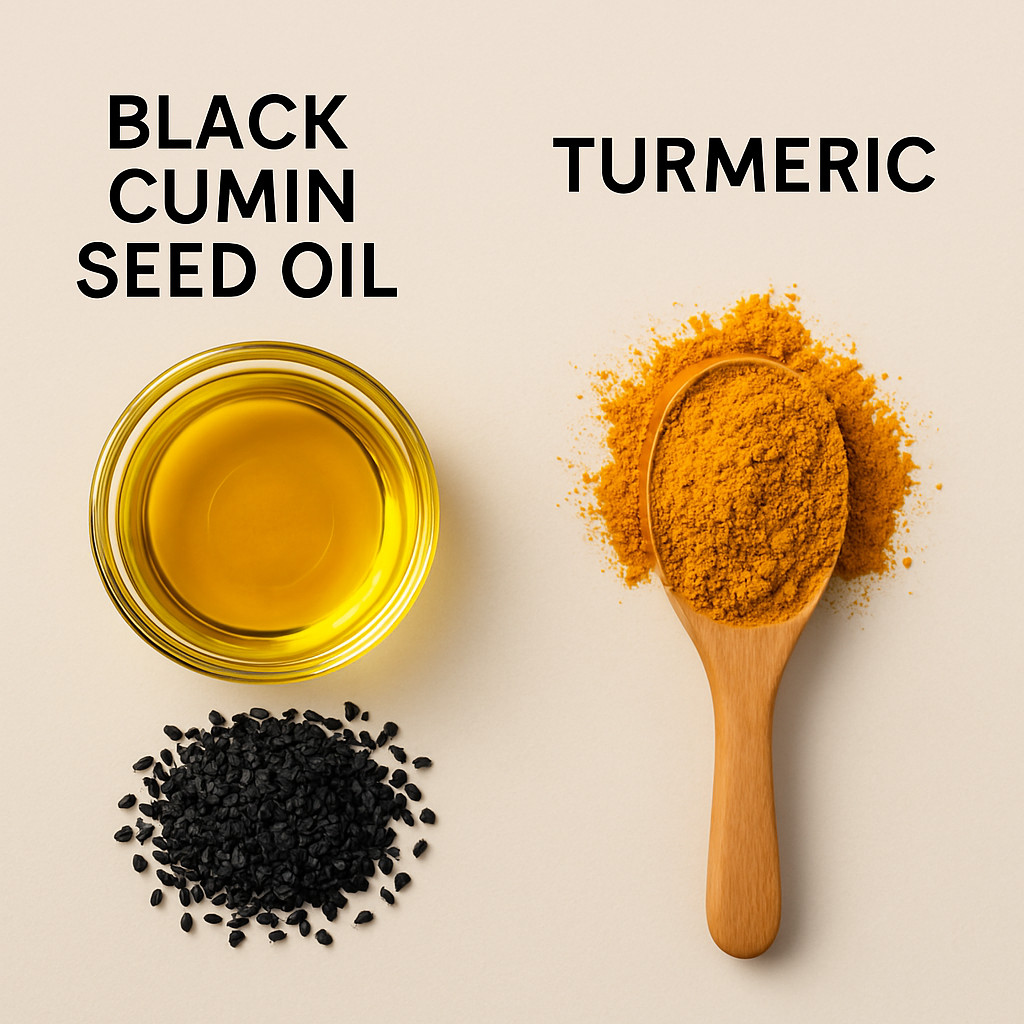Black Cumin Seed Oil (Nigella Sativa)
- Supports: Antioxidant activity, inflammation control, immune modulation, and even lipid profile improvement.
- Safe combo: Yes, especially with turmeric.
Turmeric (Curcumin)
- Supports: Anti-inflammatory, antioxidant, and cholesterol/triglyceride-lowering.
- Tip: Use with black pepper or a liposomal formula for better absorption.
| Black Cumin Seed Oil | Thymoquinone (TQ), nigellone | Antioxidant, anti-inflammatory, immunomodulator, hepatoprotective, antimicrobial |
| Turmeric (Curcumin) | Curcumin (plus demethoxycurcumin, bisdemethoxycurcumin) | Potent anti-inflammatory, antioxidant, NF-κB inhibitor, cytokine modulation |
Black Cumin Seed Oil (Nigella sativa)
✅ Active Compound: Thymoquinone (TQ)
🧠 Mechanism of Action:
- Inhibits NF-κB, a key transcription factor involved in systemic inflammation.
- Modulates COX-1 and COX-2 enzyme activity (anti-inflammatory).
- Acts as a free radical scavenger.
- Promotes apoptosis in cancer cells and modulates immune response.
📚 Evidence-Based Benefits:
- Anti-inflammatory: Comparable to diclofenac in animal models.
- Antioxidant: Boosts glutathione and superoxide dismutase.
- Blood Sugar: Lowers fasting blood glucose and HbA1c in type 2 diabetes.
- Lipid Profile: Lowers triglycerides, LDL, and total cholesterol.
- Blood Pressure: Mild hypotensive effect noted in hypertensive patients.
- Asthma & Allergies: Bronchodilator effects + antihistamine activity.
- Gut Health: Antibacterial against H. pylori and other pathogens.
- Fertility: Improves sperm count and motility in men with infertility.
Turmeric (Curcumin)
✅ Active Compound: Curcumin
🧠 Mechanism of Action:
- Also inhibits NF-κB, but broader in action (influences over 100 pathways).
- Suppresses pro-inflammatory cytokines like IL-6, TNF-α, and COX-2.
- Inhibits lipid peroxidation, amyloid aggregation, and angiogenesis.
📚 Evidence-Based Benefits:
- Anti-inflammatory: Comparable to ibuprofen in knee osteoarthritis studies.
- Antioxidant: Potently scavenges ROS; upregulates NRF2 pathway.
- Joint Health: Reduces pain and improves function in arthritis.
- Brain Health: Increases BDNF, potentially helpful for depression & Alzheimer’s.
- Liver Support: Reduces liver enzymes and steatosis in NAFLD patients.
- Digestive Health: Improves symptoms in IBS and ulcerative colitis.
- Anti-cancer: Inhibits tumor proliferation and angiogenesis (lab models).
So When Would You Use One Over the Other?
| Use Case | Go with Black Cumin Seed Oil if… | Go with Turmeric/Curcumin if… |
|---|
| You want to support blood sugar and cholesterol naturally | ✔️ Proven effective | 🔶 Mild support |
| You’re dealing with immune issues, infections, or allergies | ✔️ Thymoquinone shines here | 🔶 Anti-inflammatory support |
| You’re managing chronic joint pain or arthritis | 🔶 Not primary use | ✔️ Excellent anti-inflammatory, NSAID alternative |
| You’re treating metabolic syndrome or fatty liver | ✔️ Excellent adjunct | ✔️ Also good, especially with other agents |
| You need high-level anti-inflammatory support | ✔️ Good general effect | ✔️ Strong, proven in many trials |
| You want to target neuroinflammation or cognitive support | 🔶 Some promise | ✔️ Stronger evidence for brain benefits |
| You need antioxidant and detox support | ✔️ Especially via glutathione & liver enzymes | ✔️ Potent antioxidant pathways |
| You’re sensitive to spices or turmeric | ✔️ Often tolerated better | 🔶 May cause GI upset in some |
Conclusion: Use Both for Synergy
- They’re complementary, not redundant.
- Black cumin seed oil offers broad metabolic, immune, and liver support.
- Curcumin is more targeted for inflammation, joint health, and neuroprotection.
- Used together, they can create a multi-layered anti-inflammatory, antioxidant, and metabolic strategy without overlapping too much.
Call Dr. Justin today at (337) 453-5199 to learn more about the right supplements for your health needs and get answers to your wellness questions.

